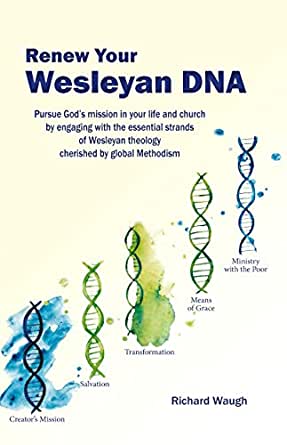Review: Dr. Rob Haynes Explores “Renew Your Wesleyan DNA”

What makes a Methodist a “Methodist”? This is an increasingly important question in the age of the rise of secularism, the decline of churches in the West, and other significant challenges in the Wesleyan/Methodist movement. As younger generations decreasingly emphasize the role of denominations, many people are no longer aware of the rich history and theology of the Wesleyan/Methodist churches they call home. In some parts of the world, leaders need fresh encouragement for mission and ministry. All the while, the global Wesleyan movement remains strong, and God continues to use it to share and show the love of Jesus Christ.
Renew Your Wesleyan DNA: Pursue God’s Mission in Your Life and Church by Engaging with the Essential Strands of Wesleyan Theology Cherished by Global Methodism by Rev. Dr. Richard Waugh (Australia: Cypress Project, 2019) is a critical resource to help contemporary Wesleyans learn the history of the movement while valuing the principles that continue to guide the most vibrant Wesleyan/Methodist churches. However, Waugh’s work is not merely a historical retelling. It is an examination and appreciation of the core of the Methodist movement. It is a call for churches and leaders to reflect upon their own ministries and reorient them for the vibrancy experienced when the “people called Methodists” are faithful to God’s call and mission.
The book is divided into eight chapters around three themes: Wesleyan Identity, Wesleyan DNA, and 21st-Century Ministry. Independently and cohesively, these provide a helpful view of the rich history of the Wesleyan movement, its ability to hold a variety of theological positions in a healthy tension, and a call to action for the contemporary church. Waugh identifies five strands of Wesleyan DNA: Creator’s Mission, Salvation, Transformation, Means of Grace, and Ministry with the Poor. These, he says, “encapsulate the essence…of Wesleyan emphases.” He uses them to illustrate the unique way in which John Wesley balanced biblical and theological principles. Waugh demonstrates their application for modern Christian discipleship. The book’s usability is further expanded through the author’s inclusion of historical and theological profiles that show evidence of Wesleyan DNA through various expressions of the global church. While these profiles include a brief historical account, the highlighting of the contemporary gospel witness in each context is enriching.
The global Wesleyan movement has a varied and complex history. Waugh successfully navigates this complexity by providing two separate narratives to illustrate one grand story: the first primarily concentrates on geographic particularities (see chapter two). The second recounts the ways in which Methodism has influenced various theological streams, ecumenism, missional witness, education, healthcare, and other important areas (see chapter eight). He handles these complexities in a way that remains appropriately thorough yet approachable for a general international audience. After all, according to Waugh, over 100 million people from more than 160 countries follow Jesus in the company of the Wesleys. Appropriately, he does not attempt to recap them all. Rather, he gives proper appreciation of various iterations to encourage the reader to apply the Wesleyan DNA into each local ministry. Throughout the work, Waugh’s unique voice as a Wesleyan Methodist leader from the South Pacific gives an important timbre to the conversation.
In some corners of Methodism, leaders have failed to attend to the doctrine that Mr. Wesley sought to preserve. Publications such as this, grounded in modern biblical and theological scholarship while accessible to a broad audience, are important for a deeper sense of belonging in the way God continues to use the global Wesleyan movement.
With thoughtfulness for local church application, small group discussion questions are included. Other helpful resources include a church audit guide, celebration service, and worship guides for Watchnight, Covenant Renewal, and Aldersgate services.
Renew Your Wesleyan DNA is a helpful addition to the libraries of Wesleyan/Methodist laity and pastors alike. It provides a fresh, global perspective on the vibrancy of the People Called Methodist. The work offers tools for individuals, small groups, and congregations to go deeper in their own faith development alongside their Wesleyan/Methodist kindred in the worldwide movement.
Featured image courtesy Elena Mozhvilo on Unsplash.
